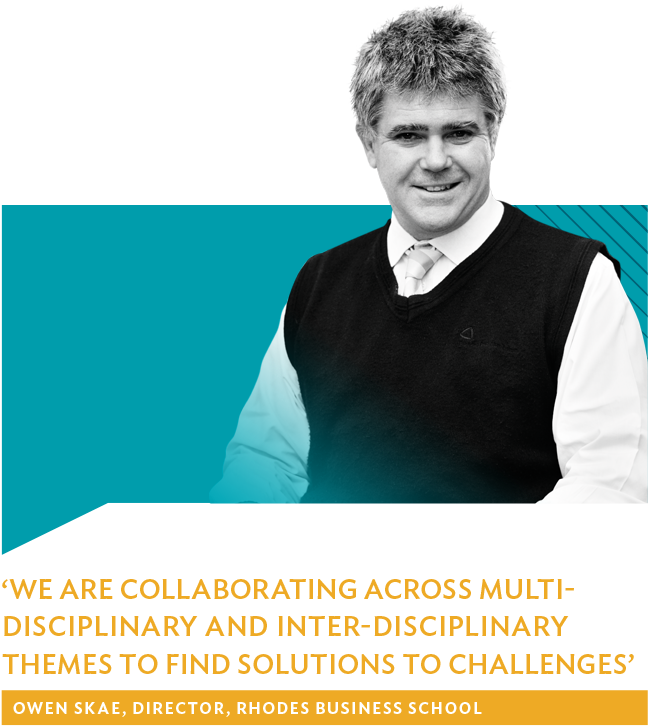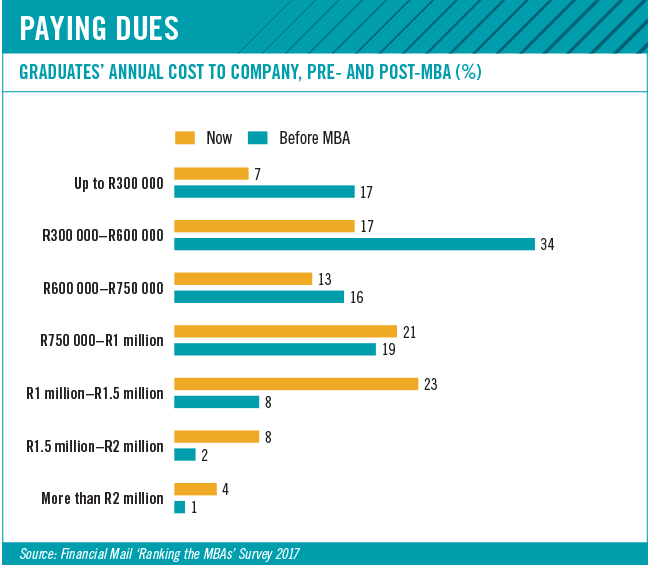According to Nicola Kleyn, dean of the University of Pretoria’s Gordon Institute of Business Science (GIBS), although business ethics have always formed the cornerstone of the business school’s curriculum, ‘the prevalence of ethical breaches – both globally and more specifically in the South African context in the past year – underscores the importance of deepening the understanding of the ethical dimensions of business decisions’.
She maintains that business schools cannot prescribe the conduct of their students in years to come. ‘But what we can do is attune students to ethical nuances and the implications of ethical breach and poor governance on corporate and personal reputation, not to mention affected stakeholders.’
The University of Stellenbosch Business School (USB) has designed the Business in Society course to deal with governance, ethics and decision-making in business. Piet Naudé, dean and director of USB, says that the leadership journey on the MBA starts by looking at one’s own values and includes a portfolio of reflections on leadership development. He adds that ethics can in fact be taught. ‘It is not true that one is born with a static moral orientation. There are studies showing that students who are exposed to learnings about business ethics can and do change their business conduct, and do develop a sharper decision-making ability.’
Two campaigns – #corporateactivism and #nomorebribes – were launched by Henley Business School to raise awareness among executives of how making the wrong decisions can damage individual reputations and businesses. ‘Henley Business School is rooted in a deep sense of ethics, and we are working hard to stop the negative effects of collusion and corruption in state capture,’ says dean and director of Henley Business School, Africa, Jonathan Foster-Pedley. ‘Our focus in ethical governance is on compromise. It’s not so much as having an adult course on ethical management as understanding the ethical implications one makes as a manager, leader and business person, or in any role in organisational life,’ he says.
While there are multiple ways to teach business ethics, GIBS makes extensive use of case studies to identify, discuss and attempt to resolve issues with ethical implications. ‘Recent events in both the corporate and public sphere have provided fertile learning opportunities for students of business and management,’ says Kleyn. ‘In the past few months, two case studies focusing specifically on decisions taken by McKinsey and KPMG have been written by GIBS faculty.
‘A further case study, focusing on the issue of accountability in and beyond the context of the tragic mismanagement of patients in the Esidimeni hearings, is also being written by members of our faculty. It’s important that business schools translate ethical breaches into opportunities for learning so that we avoid repeating such transgressions.’
GIBS is due to launch its new MBA format in September, which will replace the traditional functional style of courses covered in an MBA with thematic considerations including innovation and strategic execution.
Similarly, changes to the Rhodes Business School MBA curriculum are also afoot. ‘Our focus is more on the internet of things, and we are currently developing courses on data analytics,’ says Owen Skae, director of Rhodes Business School. ‘We are also increasingly collaborating across multidisciplinary and inter-disciplinary themes, as it is essential to bring different and integrated perspectives to find solutions to our unique challenges and opportunities.’
Rhodes Business School emphasises responsible leadership and sustainability in its MBA, which is based on an unique 4E model, which is fully embedded in all its subjects.
‘The 4E model being “economy” – requiring an inclusive, growing and closed-loop economy where we emphasise systems thinking, cradle-to-cradle innovation, social justice, and top-line thinking; “ethics” – making the business and moral case for sustainable business practices; “ecology” – it is essential that we acknowledge the importance of natural capital, and its responsible and sustainable use, ideally where we do no harm, considering true cost; and lastly, “equity” – where everybody has access to skills and requisite financial, technological and intellectual resources capitals, ensuring fairness and transparency for a legitimate social purpose of business,’ says Skae.
He adds that ‘students are also exposed to specialised forms of accounting such as natural capital accounting and environmental profit and loss, to provide context to the model’.
Kleyn comments that given the fluidity of social, economic and political contexts, the formulation and execution of strategy has needed to shift to become more agile and responsive to complex and less certain futures. Not only do students need to be exposed to contemporary thinking about strategy formulation and execution, but they need to develop the skills to make decisions with incomplete information and about contexts that they don’t fully understand. ‘A range of learning methods and tools including case studies, simulations, engagement with practitioners and experiential learning assist in providing students with opportunities to hone their knowledge and skills,’ she says.
Meanwhile, additional changes to the USB MBA include leading business in an age of technology disruptions. Naudé notes that technology is changing the very nature of business and a new kind of leader ‘who can deal with the enormous potential and inherent risks associated with technology’ is required.
USB also introduced a more African focus into its MBA with international study tours to local destinations that include case studies on African companies. Two new specialisations, namely leading international organisations (in association with the UN) and healthcare management (in close co-operation with the Stellenbosch University Health Sciences Faculty), have commenced.
Clearly, the impact of technology is profound. ‘[The impact of] technological innovations on firms and their stakeholders in today’s world cannot be ignored. Incorporating technology into the development and execution of business models cannot simply be plugged and played from business models that do not take socio-economic and regulatory aspects of operating environments into account,’ explains Kleyn.
‘We believe that African business schools need to not only ensure that students across academic and executive programmes are attuned to the implications of rapid shifts in technology, but need to enable exploration and innovation that is relevant to our continent’s people and needs.’
Skae adds that the principles of sustainability are brought into the Rhodes Business School MBA curriculum, acknowledging the African context and ensuring a global connection. Specific core courses include stewardship and governance, responsible leadership, and ethical organisation.
Management and business literature is dominated by authors studying phenomena in North American and European contexts but Kleyn states that GIBS is passionate about encouraging students and faculty to interrogate theories, models and frameworks to ensure that they are contextually relevant. ‘We also actively support the development of thought leadership that focuses not only on African styles of management, but on the development and execution of business strategies across our African contexts.’
Embracing change altruistically, Henley Business School’s flexible MBA is designed for students with families and offers them a friendlier study experience. Free sessions are also available to all parents on issues such as positive parenting, managing relationships and stress management. These help minimise the potential damage that the demands of studying can bring to families, creating a positive environment – bringing people together rather than causing undue stress.
An MBA is available with additional programmes to help people learn the skills of creativity and innovation, says Foster-Pedley. ‘This started by focusing on the music industry, but has now stretched to all the creative industries. These are sessions that focus on things like design thinking; working with creatives; managing innovation and creative process; understanding how to add value in volatile environments; and how to be inventive and focus on innovation as well as efficiencies.’
It’s obviously a new dawn for business leadership in SA in a time where the world is growing less tolerant of misuse of power and unethical governance, combined with a global shift towards the use of technology at every level of corporate life.











